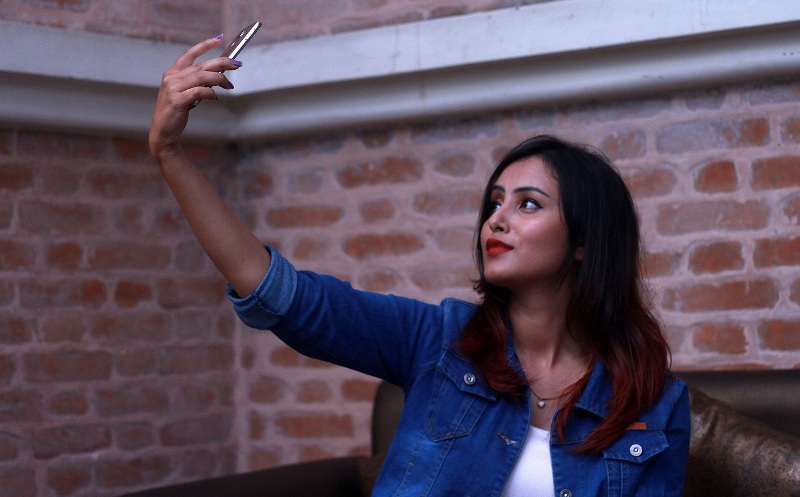
‘But first, let me take a selfie.’ You probably hear this every day, or even say it yourself right before the holy act of taking selfies. Thanks to smartphones, selfies have been a part of our life for a while now. But researchers and scientists warn that taking selfies or being a selfie addict could be associated with loneliness, vanity, and an act of getting approval of others.
You definitely know a certain someone who is always taking pictures of themselves, no matter what the occasion is. Selfies at home, in the office, at parties, selfies when they are alone and the list goes on. Not only that, that person’s Facebook or Instagram is an endless compilation of selfies. (Note: If you do not know that person, it might be you.)

Simply said, people are addicted to taking selfies these days. While many of us enjoy the act, it could make us insane if the urge isn’t taken care of sooner. Let’s take an example of 21-year-old Danny Bowman. His story of selfie addiction is quite shocking. Danny was addicted to taking selfies when he was 19. Believe it or not, he used to take up to 200 selfies each day on his iPhone. Over the next six months, he didn’t leave his house, and eventually dropped out of school. Danny used to spend 10 hours a day trying to take a perfect selfie. As his frustrations grew when couldn’t click that perfect picture, he attempted suicide.

A research was conducted in over 1,200 men and women by psychologists from Poland and Germany. The results showed a connection between self-esteem and selfie posting among men. Those who thought highly of themselves tended to post more own selfies, although there was no relationship between self-esteem and the frequency of posting group selfies. [Sorokowska A, Oleszkiewicz A, Frackowiak T et al. Selfies and personality: Who posts self-portrait photographs? Personality and Individual Differences. 2016]
One of the lead authors of the study, Agnieszka Sorokowska wrote, “On the one hand, people with high, stable self-esteem might be eager to share their photos because they are not susceptible to criticism. On the other hand, people with low self-esteem might be even more willing to engage in online self-promotion in order to raise their self-esteem.”
Likewise, a research conducted on men by Ohio State University concluded that narcissism and psychopathy in a person resulted in the total number of selfies shared. [Published online in the journal Personality and Individual Differences] Another research published in ‘Scientific Research‘ revealed that the time people spent on using Facebook, going through other people’s profile, watching videos and even the way they view their own Facebook profile was linked with high levels of narcissism.
Researchers in Thailand recently conducted an interview with 300 students which mostly constituted of females aged between 21 and 24 measuring narcissism, selfishness, loneliness and attention-seeking characters. [Published in Journal of Psychosocial Research on Cyberspace]
They later found that intensity of usage of social media and selfie-liking was directly associated. In an interview with Daily Mail, Dr. Peerayuth Charoensukmongkol, lead researcher, said, “Individuals with higher degrees of loneliness tend to report selfie-liking to a greater extent. Taking selfies allows individuals to control what other people see in the photos, it is not surprising that those who exhibit these narcissistic characteristics tend to like selfies because it helps them achieve this personal goal.”
If you’re worried that you could be addicted to selfies, look out for the following signs (source: carteblanche)
- You can’t make it through the day without taking at least one selfie.
- You spend a lot of time thinking about selfies, planning where and when to take them.
- There are instances when you simply cannot fight the urge to take a selfie, no matter how hard you try.
- You often find yourself taking selfies when you’re meant to be doing something important.
- You’ve realized you’re taking too many selfies, but can’t get yourself to cut down on the amount.
- You are almost obsessively checking to see how many people like your selfie and you take it personally when there’s little or no response.
- Taking selfies has interfered with your social life and relationships.
- You start to think about everything you do as a possible selfie.
- You feel better about yourself or more important when you post a selfie.
Although it may be little less hurtful than online bullying, trolling and other online crimes, it is important to acknowledge the addiction to taking selfies as a disorder in this transitioning connection between human beings and technology. We all know we have been narcissistic enough to check how many likes our selfies reached. Let’s hope that we use social media wisely and not have too many Dannys.







![Best Gaming Laptops in Nepal Under Rs. 250,000 (रु 2.5 Lakhs) [2025] Best Gaming Laptops Under 2.5 lakhs in Nepal [Feb 2025 Update]](https://cdn.gadgetbytenepal.com/wp-content/uploads/2025/02/Best-Gaming-Laptops-Under-2.5-lakhs-in-Nepal-Feb-2025-Update.jpg)
![Best Gaming Laptops in Nepal Under Rs. 120,000 (रु 1.2 Lakhs) [2025] Best Budget Gaming Laptops Under Rs 120000 in Nepal 2025 Update](https://cdn.gadgetbytenepal.com/wp-content/uploads/2025/05/Best-Budget-Gaming-Laptops-Under-Rs-120000-in-Nepal-2024-Update.jpg)
![Best Laptops Under Rs. 80,000 in Nepal [2025] Best Laptops Under 80,000 in Nepal March 2025 Update](https://cdn.gadgetbytenepal.com/wp-content/uploads/2025/03/Best-Laptops-Under-80000-in-Nepal-March-2025-Update.jpg)
![Best Gaming Laptops in Nepal Under Rs. 200,000 (रु 2 Lakhs) [2025] Best gaming lapotp under 2 lakhs Nepal Feb 2025](https://cdn.gadgetbytenepal.com/wp-content/uploads/2025/01/Best-Gaming-Laptops-Under-2-Lakh-Nepal-Feb-2025-Update.jpg)

![Best Mobile Phones Under Rs. 15,000 in Nepal [Updated 2025] Best Phones Under 15000 in Nepal 2024 Budget Smartphones Cheap Affordable](https://cdn.gadgetbytenepal.com/wp-content/uploads/2024/03/Best-Phones-Under-15000-in-Nepal-2024.jpg)
![Best Mobile Phones Under Rs. 20,000 in Nepal [Updated] Best Mobile Phones Under NPR 20000 in Nepal 2023 Updated Samsung Xiaomi Redmi POCO Realme Narzo Benco](https://cdn.gadgetbytenepal.com/wp-content/uploads/2024/01/Best-Phones-Under-20000-in-Nepal-2024.jpg)
![Best Mobile Phones Under Rs. 30,000 in Nepal [Updated 2025] Best Phones Under 30000 in Nepal](https://cdn.gadgetbytenepal.com/wp-content/uploads/2025/01/Best-Phones-Under-30000-in-Nepal.jpg)
![Best Mobile Phones Under Rs. 40,000 in Nepal [Updated 2025] Best Phones Under 40000 in Nepal 2024 Smartphones Mobile Midrange](https://cdn.gadgetbytenepal.com/wp-content/uploads/2024/02/Best-Phones-Under-40000-in-Nepal-2024.jpg)
![Best Mobile Phones Under Rs. 50,000 in Nepal [Updated 2025] Best Phones Under 50000 in Nepal](https://cdn.gadgetbytenepal.com/wp-content/uploads/2025/01/Best-Phones-Under-50000-in-Nepal.jpg)
![Best Flagship Smartphones To Buy In Nepal [Updated] Best flagship phone 2025](https://cdn.gadgetbytenepal.com/wp-content/uploads/2024/07/Best-Flagship-Phones-who-is-it-ft-1.jpg)